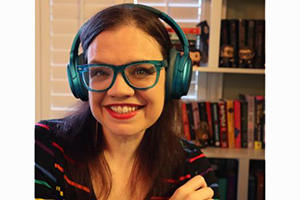- Apply
- Visit
- Request Info
- Give



Published on March 05, 2021

Casey Fiesler, assistant professor of information science at the University of Colorado.
Casey Fiesler, assistant professor of information science at the University of Colorado, spoke about online “fan communities” at Eastern Connecticut State University on March 3. During “Growing Their Own: Lessons from Community-Driven, Feminist Technology Design,” Fiesler discussed the growing representation of gender, sexuality and disability in fan communities.
Focusing her presentation on “Archive of Our Own (AO3),” a fan-created website launched in 2009, Fiesler described fanfiction as “written continuations of already existing properties.” She said that fan culture did not begin with the Internet, sharing fanart that dated back to 1968. Nonetheless, fan communities have blossomed in the past 20 years or so.
Hoping to create a space for those feeling left out of pre-existing fan sites, a group predominately made up of women created AO3. “Often the people who are attacked on the Internet (women, minorities, LGBTQ+) are marginalized groups and are underrepresented,” said Fiesler. Unlike previous platforms, the AO3 site was made to accommodate all types of people. “The site was built by people who needed this. It is built, run and contributed to mostly by and for women.”
While the site serves and was created by women, it also benefits people with disabilities and the LGBTQ+ community. For many people, AO3 was the only space they were comfortable “coming out,” said Fiesler. “They were able to find these communities without the risk of a Google search.”
Fiesler added that services in AO3, such as clearer screens and translations, also helped to reach communities that usually weren’t considered.
The most significant thing that separates AO3 from other fan sites is that it is almost entirely run by volunteers, said Fiesler. Even today, the site accepts donations to keep the servers running, but otherwise depends entirely on unpaid contributions. Members who have never coded before taught themselves and continue to do so as they develop aspects of the site.
“Everyone was allowed to fail because the project was a labor of love, which is a rare experience compared to other collaborative sites like Wikipedia,” she explained. Creators of AO3 made it a goal not to hire outside developers, instead allowing their team of chiefly women to challenge themselves and grow in the field of coding. The outcome — recognition from the Hugo Awards, a recognition program that is usually male dominated — gave hope to expanding diversity in computer science.
There is still a long way to go, however. “The computer science community is usually white and male,” said Feisler, saying race is the least diverse aspect of fandoms. “I don’t want to pretend it’s diverse in all aspects.”
Fiesler also noted that fandoms make important contributions to activism. Groups such as the Harry Potter Alliance and LGBT Fans Deserve Better work to expand racial equality and break barriers in gender and sexuality. Having a platform like AO3 allowed groups to come together and organize as never before; Fiesler said the archive was about “building something for the community, to help others as a resource.”
She concluded by posing the question, “If more platforms such as Twitter were created to be inclusive to all groups of people, how would social interactions change, and would the technology industry become more diverse?”
Sukeshini Grandhi, business information systems professor, hosted Fiesler’s presentation in collaboration with Eastern’s University Hour committee.
Written by Molly Boucher